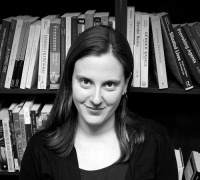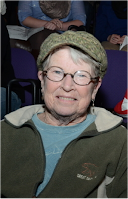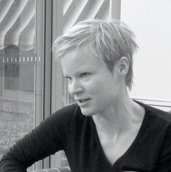WHAT IS IT LIKE TO BE A PHILOSOPHER? Students may find especially interesting the interviews at Cliff Sosis' project, What is it Like to Be a Philosopher? As he says, "The interviews give us a fuller picture of how the people who do philosophy work, and a better idea of how philosophy works." It turns out that each philosopher is a human person. Recommended reading! |
Highlighted Philosophers
Lydia Goehr: November 2013
Lydia Goehr Columbia University Lydia Goehr has been Professor of Philosophy at Columbia University for twenty years. Her work is primarily in the history, ancient and modern, of aesthetic theory. Engaged with the history and politics of the arts, her work focuses on understanding how norms and power have come to be contained in and by concepts that structure and regulate practices. She has written extensively on concepts of the musical art, although recently her work has turned to the complex and agonistic role that the very concept of music has had in generating the age-old contest of the arts, a contest that has pitted not only the different arts against each other but also philosophy and religion against the arts. Although she has not worked in feminist philosophy, her engagement with critical theory and the ideology of war has allowed her to pursue parallel arguments that test the grounds or legitimation of different forms of authority. In addition to many articles on the thought of Theodor W. Adorno, Maurice Merleau-Ponty, and Arthur Danto, she is the author of three books, The Imaginary Museum of Musical Works: An Essay in the Philosophy of Music; The Quest for Voice: Music, Politics, and the Limits of Philosophy; and Elective Affinities: Musical Essays on the History of Aesthetic Theory, and co-editor with Daniel Herwitz of The Don Giovanni Moment. Essays on the Legacy of an Opera (2006). With Gregg Horowitz, she is series editor of Columbia Themes in Philosophy, Social Criticism, and the Arts, Columbia University Press. At Columbia, she offers courses in the history of aesthetic theory, the contemporary philosophy of the arts, critical theory, and the philosophy of history. Her current seminar is on thought-experiments in philosophy and the arts. In 2009/2010 she received a Lenfest Distinguished Columbia Faculty Award, in 2007/8 The Graduate Student Advisory Council (GSAC)'s Faculty Mentoring Award (FMA), and in 2005, a Columbia University Presidential Award for Outstanding Teaching. She is a recipient of Mellon, Getty, and Guggenheim Fellowships, and in 1997 was the Visiting Ernest Bloch Professor in the Music Department at U. California, Berkeley. She has been a Trustee of the American Society for Aesthetics and is a member of the New York Institute of the Humanities. In 2012, she was awarded the H. Colin Slim Award by the American Musicological Society for an article on Wagner's Die Meistersinger. She has also spent much time in Europe. In 2002-3, she was the visiting Aby Warburg Professor in Hamburg and a fellow at the Wissenschaftskolleg zu Berlin. In 2005-6, she delivered the Royal Holloway-British Library Lectures in Musicology in London and the Wort Lectures at Cambridge University. In 2008, she was a Visiting Professor at the Freie Universität, Berlin (Cluster: "The Language of Emotions") and in 2009, a visiting professor in the FU-Berlin SFB Theater und Fest. Although educated in London, she lives intellectually and emotionally on the plane between Berlin and New York. |
Amy Allen: November 2013
Amy Allen Dartmouth College
Allen’s current research project aims to expand her conceptualization of power to encompass issues of nationality and culture within a transnational frame. This move has been driven by the recognition that a genuinely intersectional analysis of gender subordination must not only encompass race, class, sexuality and gender but must also confront issues of nationalism, colonialism and post-colonialism, and cultural imperialism. Her current work explores the pressure that this transnational, intersectional, postcolonial feminist perspective puts on the broadly speaking left-Hegelian strategy, adopted by prominent critical theorists such as Habermas and Axel Honneth, that seeks to ground normativity in a progressive reading of history. Her aim is to find an alternative strategy for grounding normativity that remains true to the methodology of critical social theory while taking on board a postcolonial-feminist perspective. This project will soon culminate in a book, tentatively titled The End of Progress: Critical Theory in Postcolonial Times. |
Susanne Sreedhar: November 2013
Susanne Sreedhar Boston University Susanne Sreedhar is an assistant professor of philosophy at Boston University. Her influential research addresses the moral and political questions that arise within the history of the social contract tradition. The bulk of this research thus far has focused on the nature and scope of political obligation, and the justifiability of civil disobedience. She is the author of Hobbes on Resistance: Defying the Leviathan (Cambridge University Press, 2010) in which she defends a novel interpretation of Hobbes’s account of political obligation and authority. While most scholars view Hobbes as a theorist who advocates complete submission to an absolute sovereign, she articulates a coherent Hobbesian account of the right to disobey and resist sovereign power. She wants not only to expound various aspects of Hobbes’s philosophy, but also to put him in conversation with other theorists of his time (e.g., Grotius, Pufendorf, Filmer, and Locke in the 17th century; Montesquieu, Voltaire, Kant, and Rousseau in the 18th century). She is interested in the transformation of social contract theory itself, the emergence of ideals of religious toleration, and the development of constitutionalism and democratic theory through the French and American revolutions. Professor Sreedhar’s most recent work is in feminist history of philosophy. She has begun a second book, tentatively entitled Gender and Early Modern Social Contract Theory that takes up questions about the family, gender, and sexuality in 17th and 18th century political thought. In this book she will argue that, from the perspective of gender, there is a radical potential for equality inherent in modern social contract theory that has been present since its inception. She wants to trace the ways in which that potential has been recognized - or indeed, dismissed, purposefully ignored, and circumvented - by the contract theorists themselves, as well as by many of their critics. While there have been sweeping critiques of the contract tradition, alongside defenses and re-readings of individual members, Sreedhar aims to give a sustained investigation into the feminist potential of the tradition as a whole. She has received fellowships from the Boston University Center for the Humanities and the National Humanities Center in North Carolina to support this research. She teaches courses on ethics, political philosophy, philosophy of law, the history of philosophy, and the philosophy of gender and sexuality. |
Joan Callahan: November 2013
Joan Callahan University of Kentucky She has served as the editor of the American Philosophical Association Newsletter on Feminism and Philosophy, and on the American Philosophical Association Committee on the Status of Women. She is a founding member of FEAST, the Association for Feminist Ethics and Social Theory. She has also served on the American Philosophical Association Board of Officers, the Council to the Chair of the APA Board, the APA Committee on the Status and Future of the Profession, and as Chair of the APA's Committee on Inclusiveness in the Profession. In 2007 Professor Callahan was honored as the U.S. Society for Women in Philosophy's Distinguished Woman Philosopher. In 2008, she was the faculty recipient of the President's Award for Diversity at the University of Kentucky. Most recently, she has been working with Nancy Tuana on filming in-depth interviews with many of the scholars who made up the first cohort of feminist philosophers in and affecting North American philosophy. That project involves two days of filming with each participant, followed by the production of two-hour edited versions of the interviews, which are available as they are produced through the Rock Ethics Institute at Penn State University (http://rockethics.psu.edu/education/oral-history-feminist-philosophers . |
Ann Garry: November 2013
Ann Garry California State University, Los Angeles Ann Garry is Professor of Philosophy Emerita at California State University, Los Angeles, where she was founding director of the Center for the Study of Genders and Sexualities and served several terms as Philosophy Department Chair. In the past decade she has also taught at UCLA, as Humphrey Chair of Feminist Philosophy at the University of Waterloo, and on two Fulbright fellowships, the first at the University of Tokyo and, in fall 2013, at Eötvös Loránd University in Budapest. Garry’s work in feminist philosophy and on behalf of women and other underrepresented groups in philosophy spans a broad range of activities over four decades. There was much work to do in the early days of feminist philosophy. Garry was on the ground floor, participating in much of it. She developed early courses in feminist philosophy and gave workshops on integrating feminism into other courses. She was one of the founders of Hypatia: A Journal of Feminist Philosophy and of the Society for Women in Philosophy, Pacific Division. She served on the APA Committee on Women in the 1970s and another term later. Through the decades she has kept up this pace in many projects, most recently by becoming one of the editors of feminist philosophy for The Stanford Encyclopediaof Philosophy and of the Feminist Philosophy category of PhilPapers. Although Garry’s education was in mainstream analytic epistemology and philosophy of mind, she claimed feminist philosophy as her specialty in the 1970s and has pursued it ever since. In her current work she pursues themes of intersectionality, earlier versions of which can be seen in, for example, “Intersectionality, Metaphors, and the Multiplicity of Gender” (Hypatia 2011). She is also working with Serene Khader and Alison Stone on a Routledge Companion to Feminist Philosophy. Over the decades she has written on a wide range of topics ranging from pornography, abortion, and feminist bioethics to feminist epistemology and philosophical methods, especially in relation to analytic philosophy (see, for example, “A Minimally Decent Philosophical Method? Analytic Philosophy and Feminism” [Hypatia 2005]). She also co-edited Women, Knowledge and Reality (Routledge 1996) and a special issue of Hypatia in 2009: Transgender Studies and Feminism: Theory, Politics, and Gendered Realities.
|
Teresa Blankmeyer Burke: October 2013
Teresa Blankmeyer Burke Gallaudet University Teresa Blankmeyer Burke is assistant professor of philosophy at Gallaudet University, the world’s only liberal arts college for deaf and hard of hearing people. She received her bachelor’s degree from Mills College, and her master’s and doctoral degrees from the University of New Mexico. She is the first signing Deaf woman in the world to receive a Ph.D. in philosophy, having accessed her graduate education through American Sign Language (ASL) interpreters. photographer: Rhea Kennedy Burke’s research for the most part resides in deaf philosophy, the space where philosophy intersects with Deaf studies. (The use of uppercase Deaf designates the cultural community of signed language users; lower case deaf designates audiological status). Topics she has published on include moral justification regarding the use of genetic technology to bear deaf children (specifically, the question of signing Deaf potential parents considering this option) and signed language interpreting ethics. Burke has interests in virtue ethics, and is using the professional virtues of signed language interpreters, such as (glossed in ASL) DEAF-HEART and ATTITUDE, as a testbed for philosophical accounts of the virtues. Another project uses the notion of deaf gain (contra hearing loss) to work through conceptions of intrinsic and instrumental value. Her newest endeavor explores questions related to deaf well-being; works in progress include papers on deaf liberty and full access to language as a good. She is coauthoring the book Puzzles About Disability (Oxford 2014) with Adrienne Asch, Margaret Battin, Gretchen Case, Leslie Francis, and Anita Silvers.
Burke’s teaching is driven by her experience of learning philosophy in ASL and English. Gallaudet University is a bilingual university -- she teaches philosophy in ASL, using English language texts. Given that American Sign Language is a relatively new language used by few formally trained philosophers, the philosophical lexicon in ASL is quite small. One of Burke’s aims in teaching philosophy to deaf and hard of hearing students is figuring out what it is to do philosophy in American Sign Language. This is not only a matter of developing the necessary philosophical vocabulary in ASL, but also includes such considerations as determining how linguistic features (e.g. use of space, hand and body orientation, gaze) mark philosophical moves, and what an argument looks like (literally) in ASL. In exploring the question of what it is to “talk philosophy” in ASL with her students, one strategy that Burke uses exploits syntactical markers in conversational ASL as pedagogical tools. As an example, when teaching her students to identify arguments, Burke employs the everyday ASL convention of asking rhetorical questions before supplying reasons, which are typically counted off in order on the non-dominant hand.
Burke contributes to public philosophy in the signing Deaf community by facilitating public discussions on bioethics and interpreting ethics through blogs and vlogs in English and ASL. She also blogs for Feminist Philosophers. Burke currently serves on the American Philosophical Association Inclusiveness Committee, the American Society for Bioethics and Humanities Task Force on Disability, the World Federation of the Deaf Bioethics Committee, and chairs the U.S. National Association of the Deaf Subcommittee on Bioethics. She has served as a reviewer for the National Science Foundation, the Journal of Deaf Studies and Deaf Education, Sign Language Studies, and the Gallaudet Research Institute. |
Susanna Schellenberg: October 2013
Rutgers University Susanna Schellenberg is an Associate Professor in the Department of Philosophy at Rutgers University. She holds a secondary appointment at the Rutgers University Center for Cognitive Science (RuCCS). Before joining the faculty at Rutgers, she spent several years at the Australian National University. Schellenberg was the first woman to be hired in a permanent position in the School of Philosophy at the Research School of Social Sciences at the Australian National University. She works on a range of topics in epistemology, philosophy of mind, and philosophy of language. The issues she has tackled include the nature of perceptual experience, evidence, capacities, mental content, and imagination. She has developed an integrated account of the phenomenological and epistemological role of perceptual experience. One of the key ideas in developing this account is that perceptual experience is a matter of employing perceptual capacities. In epistemology, Schellenberg has developed a new account of the epistemic force of experience. She argues that sensory states provide perceptual evidence due to their metaphysical structure: Sensory states are yielded by employing perceptual capacities that function to single out particulars in our environment. So there is primacy of the employment of perceptual capacities in perception over their employment in hallucination and illusion. Due to this primacy, sensory states provide us with evidence. This view of evidence is externalist while avoiding the pitfalls of reliabilist accounts. Moreover, it provides for an evidential answer to how and why we are in a better epistemic position when we perceive than when we hallucinate. In philosophy of mind, Schellenberg has defended the idea that experience is representational and developed a detailed account of the nature of perceptual content that advances a new way of understanding singular modes of presentations. She argues that experience is fundamentally both relational and representational. This view of content has interesting implications for the sensory character of experience. It provides for a way of understanding sensory character in terms of a mental activity, more specifically, in terms of employing perceptual capacities. The idea is that in hallucination, we employ the very same perceptual capacities that in a subjectively indistinguishable perceptual experience are employed as a consequence of being related to external, mind-independent objects or property-instances. Employing perceptual capacities yields a mental state with content. This representational account of sensory character is an alternative to the orthodox approach on which sensory character is analyzed in terms of awareness relations to abstract entities, such as properties, sense-data, or other peculiar entities. By arguing that we employ the very same perceptual capacities in subjectively indistinguishable perceptions, hallucinations, and illusions, Schellenberg provides a substantive way of understanding the common factor between these experiences. Another focus of her research has been space perception and the situation-dependency of perception. In addition to her primary areas of research, she has written papers on inferential semantics and the philosophy of Gottlob Frege. |
Lisa Tessman: September 2013
Lisa Tessman Binghamton University Lisa Tessman is an Associate Professor of Philosophy, and an affiliated faculty member in the program in Women, Gender, and Sexuality Studies, at Binghamton University. She teaches in the Graduate Program in Social, Political, Ethical and Legal Philosophy (SPEL), as well as in undergraduate programs in Philosophy, and in Philosophy, Politics and Law (PPL). Tessman received her BA in Philosophy from Carleton College in 1988, and her Ph.D. from the University of Massachusetts, Amherst, in 1996. Tessman’s research is primarily in ethics; her approach is feminist, and she contextualizes her work by considering the social and political conditions in which moral experiences take place. Her first monograph, Burdened Virtues: Virtue Ethics for Liberatory Struggles, was published by Oxford University Press in 2005. It focuses on virtues that carry a cost—in terms of flourishing—to those who practice them under oppression. She has also published a number of articles, has edited a collection called Feminist Ethics and Social and Political Philosophy: Theorizing the Non-Ideal (Springer, 2009), and has co-edited (with Bat-Ami Bar On) a volume called Jewish Locations: Traversing Racialized Landscapes (Rowman & Littlefield, 2001). Tessman is currently working on a second monograph, tentatively entitled Moral Failure: On the Impossible Demands of Morality, which exposes difficulties of moral life that result from some moral failures’ being inevitable. The book investigates several different literatures—ranging from scholarship on Holocaust testimony to ideal and nonideal theory, from accounts of supererogation to debates about moral demandingness and to feminist care ethics—in which impossible moral requirements tend to be unacknowledged. In this range of settings, the denial that there can be impossible moral requirements obscures something about the contingent experience of a certain kind of deep valuing, namely that it constitutively involves taking some acts to be unthinkable and others to be non-negotiably required. Taking a constructivist approach, Tessman tries to make sense of how moral requirements that contravene the principle that “ought implies can” can come to carry moral authority, and how apprehending these impossible moral requirements impacts moral life. Tessman was a founding member of the Association for Feminist Ethics and Social Theory (FEAST) and served on its Steering Committee from 1999-2011 in a variety of capacities, including Chair of the Steering Committee, Chair of the Program Committee, and Chair of the Diversity Committee. She has also been serving since 2009 on the Board of Associate Editors for Hypatia: A Journal of Feminist Philosophy. Tessman also served for a term on the APA Committee on Inclusiveness in the Profession, and on the Distinguished Woman Philosopher Award Selection Committee for the Society for Women in Philosophy (SWIP). |
Carrie Figdor: September 2013
Carrie Figdor University of Iowa Carrie Figdor is Associate Professor in the Department of Philosophy and the Interdisciplinary Graduate Program in Neuroscience at the University of Iowa. She received her B.A. in political science from Swarthmore College and her M.A. and Ph.D. in philosophy from the City University of New York Graduate Center. She works primarily in philosophy of mind and philosophy of cognitive science (including psychology and neuroscience), and metaphysics. As a former newswoman for The Associated Press and other news organizations, she also writes on issues in journalism ethics and science communication, in particular regarding public understanding of neuroscience results. She is currently a research fellow at the Center for Philosophy of Science at the University of Pittsburgh, writing a book in philosophy of cognitive science, Pieces of Mind: A Humanistic Defense of Mechanistic Explanation of Mind. The book develops a theoretical foundation for scientific efforts to explain the mind-brain relationship by drawing on features and concepts of processes that importantly distinguish them from objects and object concepts. She is the author of articles in The Journal of Philosophy, Philosophy of Science, Neuroethics, The Journal of Mass Media Ethics, and other publications. Figdor is a member of the APA’s Committee on the Status of Women, an executive committee member of the Society for Philosophy and Psychology and the Southern Society for Philosophy and Psychology, and co-host of the podcast series New Books in Philosophy (www.newbooksinphilosophy.org). |
Miriam Solomon: September 2013
Miriam Solomon Temple University Solomon is on the Editorial Board of the journal Philosophy of Science and on the Governing Board of the Philosophy of Science Association. She is on the Editorial Board of the Stanford Encyclopedia of Philosophy in the area of Philosophy of Science. She is on the organizing committee of the Philosophy of Medicine Roundtable, the Advisory Board of the Society for Philosophy of Science in Practice, and a member of the APA Committee on Philosophy and Medicine. Solomon is a Local Editorial Advisor for Hypatia and was a founding Co-Chair of the Philosophy of Science Association Women’s Caucus. She served on the APA Committee on the Status of Women from 2006-9. |







